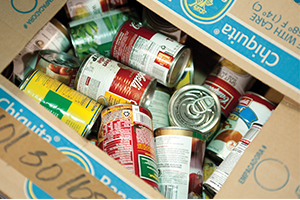Mags Gargan examines a social enterprise project which is tackling both food waste and food poverty
In Ireland an estimated one million tonnes of food is wasted annually, while 1 in 8 people are suffering from food poverty. Within communities across the country businesses are throwing away perfectly good food, while local charities are struggling to raise funding to feed those in need. Redistribution of that food seems like the obvious solution and two young entrepreneurs have come up with an app for achieving just that.
FoodCloud is a not-for-profit social enterprise that connects food businesses that have too much food with charities that have too little, through a cloud-based platform and mobile application.
FoodCloud started off as a student project when Trinity graduates Iseult Ward and Aoibhinn O’Brien met at a social entrepreneurship event and got talking about how to tackle food waste. They researched the needs of charities and approached local shops and cafes, then began dropping off food to charities themselves. They soon realised this was not sustainable and looked to technology for a solution.
FoodCloud was launched in October 2013 in Dublin city centre, with one Tesco store, a few small food businesses and six partner charities.
“They started working with Tesco as a pilot,” explains Niamh Kirwan, Marketing and Communications Manager. “That went very well so in 2014 they started to roll out with Tesco nationally and have grown from there. In Ireland we are in almost all Tesco stores and we are rolling out with Aldi. We are also operational in the UK with Tesco and we have launched a pilot with Waitrose.”
FoodCloud now works with 1,318 donating businesses across the UK and Ireland. Over 3,900 community groups and charities, from breakfast clubs to homeless hostels to family support services, have benefited from donations of surplus food via the FoodCloud platform.
Innovators
This year Iseult was named on Forbes’ prestigious “30 under-30 Europe” list of leading innovators, entrepreneurs and leaders, and The Guardian newspaper listed FoodCloud as number three in its top 10 food waste apps.
Tackling food waste has certainly become a global issue. Last year, the French government voted in a law forcing supermarkets to donate their surplus food to charity. In 2012 the European Parliament passed a resolution for urgent measures to halve food waste by 2025 and to improve access to food by the needy. The United Nations have reported that reducing food waste by just 25% could feed all the people who are malnourished globally.
Ireland is one of 200 countries that signed up to the UN Sustainable Development Goals, of which one goal (12.3) calls for a reduction in food loss and food waste. Last month at the Forum on Food Waste, the Minister for Communications, Climate Action and Environment, Denis Naughten announced the formation of an Action Group to look at how Ireland can reduce food waste by 50% before 2030. The Charter on Food Waste was also launched, asking retailers, producers, households, restaurants and manufacturers to publicly commit to reducing food waste.
The genius of FoodCloud is in its simplicity. It puts food waste to use by feeding the needy. While it is called food ‘waste’, Niamh Kirwan is keen to emphasise that it is “all perfectly good food”, which otherwise would have been thrown out by retailers. “We work very closely with the Food Safety Authority of Ireland as regards to what food can be donated and what can’t,” she says.
So how does FoodCloud work?
“In the evening a store uploads details of what food they have and that goes as a text message through the technology platform to a local charity who can go collect the food,” Niamh explains.
“The businesses have different options depending on the retailer. For some the staff in store will use the app to upload the details and some of them use an excel uploader to manage the data around the food centrally and then that is uploaded.
“Then what we have started using in the UK are instore scanners.
“The great thing about that, is that it is integrated with the retailers’ own systems. We have a tech team working to build that technology so that the staff can use their existing scanners and there is a button there to opt to donate food, which will keep a record of it, so there is full traceability of everything.”
Niamh says one of the great things about FoodCloud is the relationships that are built up at a local level, “and making sure these relationships grow and strengthen is really important”. “We have a support team who are able to work with the charities and businesses, to make sure everything runs smoothly,” she says.
Benefits
The benefits of this free service to the charities – which include Don Bosco Teenage Care, Inner City Helping Homeless, Balbriggan Meals on Wheels and Drogheda Homeless Aid – is quite obvious in that it provides good food and allows them to relocate their funding towards their core service and support their underlying mission.
The Whitefriar/Aungier Area Community Council has been involved with FoodCloud since the pilot and Brendan Dowling says over the last 5-6 years food has become a big part of what they do.
“We run a whole range of services from young people to our older members of our community. Every morning we send out a text message to about 270 families in the area saying we have this food and come between 11-1pm and people come and take it. It works,” he says.
While retailers have to pay an operational cost, Niamh says FoodCloud also has many benefits for the businesses. “The retailer would have had to pay waste costs to dispose of the food, but there are other benefits in terms of making a real impact in their community and building up relationships with charities.
“From the point of view of corporate social responsibility, and I think there is a responsibility on businesses at this time, if they have an opportunity to feed people they should do that rather than throwing good food into the bin, and I think there is a growing recognition of that.”
Sian Lewis-Wilmot from The Bretzel Bakery says FoodCloud offered them a perfect solution for their surplus stock. “We had an issue where at the end of every day we have an excess of produce in our shop. We were running around to charities with bags of stuff ourselves so when we were made aware of FoodCloud and offered an opportunity to work with them, we took that on board straight away,” she says.
Christine Heffernan, Corporate Affairs Director with Tesco said they thought it was “a fantastic idea” from the beginning.
“We really focus on trying to minimise food waste in all our operations, but inevitably as a retailer there will always be food left at the end of the day. As a result of our partnership with FoodCloud we are able to ensure that food goes to people who really need it,” she says.
FoodCloud figures
Total food redistributed: 7,256,127kg
Total meals redistributed: 15,963,480


 Mags Gargan
Mags Gargan